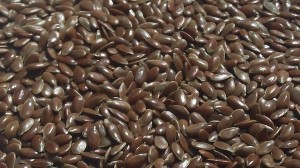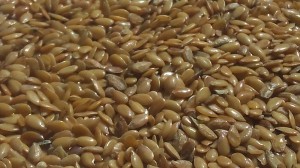 I have developed a habit of adding one tablespoon of ground flax seed to my smoothies, sometimes more. I know flax seeds
I have developed a habit of adding one tablespoon of ground flax seed to my smoothies, sometimes more. I know flax seeds have good health benefits, but that is all I know. Find out what this little seed can do for you.
History of Flax Seeds
Flax is one of the oldest known cultivated plants. According to archeological authorities, flax was being cultivated in Babylon around 5000 BC. Stone age archeological digs in Switzerland dated 3000 to 4000 BC revealed flax seeds and flax fiber cloth.
The references of the healing properties are found in Greek and Roman writings dating around 650 B.C. Hippocrates mentioned the use of flax for relieving inflamed mucous membranes and for relieving abdominal
Flax is an annual plant, that reaches a height of about 3 feet, especially if it is grown is good soil. The flax plant has small, green pointed leaves on a tough stalk and small, deep-blue flowers.
The seeds come in golden and brown and can be large or small.
Nutrients Facts about Flax
Whole flax
If you swallow flax seeds whole, you get no benefit from it. Because the seed is protected with a hard seed coat. It will pass through your body, providing your body with no nutritional benefit.
Did you know that after the seed passes through your body, the seeds can still be planted and grow?
In order to obtain the nutritional benefits from whole flax, it is best you break the seed coat. Breaking the seed coat is done by grinding the seeds in a small grinder. You get fresher flax, plus the nutrients that are in the flax.
Make sure you take freshly ground flax with plenty of fluid, because it absorbs 5 times the seed’s weight in water. I usually add 1 tablespoon of flax seed in a smoothie. If I do not have enough fluid the smoothie will thicken. Make sure you take ground flax with plenty of fluid so this does not happen.
Freshly ground flax seeds can improve:
digestion
prevent and reverse constipation
stabilize blood glucose levels
improve cardiovascular health
inhibit tumor formation
Be careful when purchasing ground flax seeds, because they can be rancid. It is always best to grind your own flax seeds.
Flax oil
Flax oil has a rich, deep-golden color and a pleasant nutty aroma. It has a light and nutty taste.
Fresh flax oil spoils when exposed to light, oxygen and heat. If you find that you dislike the taste of flax oil, then it might be spoiled, because the taste is pleasant.
Flax seed is not the richest source of both essential fatty acids. It is a poor source of linoleic acid, containing less than 20%.
Flax oil is the richest known source of the unsaturated alpha linoleic acid (LNA), which is necessary for physical health but lacking in the foods most people eat regularly.
LNA is useful in:
treating fatty degeneration in cardiovascular disease
cancer
diabetes
Flax oil is a powerful therapeutic tool against these conditions.

Protein
Flax seeds contain a high-quality, easily digestible protein that contains all essential amino acids. The essential amino acids are:
lysine
leucine
isoleucine
valine
threonine
methionine
phenylalanine
tryptophan
Essential amino acids cannot be made by your body and must be obtained from the food you eat.
Fiber
Fiber helps keep your digestive trace from clogging with mucus, toxic materials and metabolic wastes. It keeps the colon swept and clean. Fiber helps keep you regular.
It is a good idea to eat plenty of fresh fruits and vegetables every day, so that you can keep things flowing properly
Fiber is necessary to maintain intestine and colon health. It also lowers blood cholesterol. Flax is an excellent source of fiber.
Mucilage
Flax seeds have 12% mucilage and is the best natural laxative. Mucilage does the following:
has the ability to buffer acid
lowers elevated cholesterol
stabilizes and modulate blood glucose
perfect food for beneficial bacteria in the colon
Minerals
This is according to one analysis, 100 grams of flax seeds suntan the following amounts of minerals:
potassium – 0.74 g
phosphorus – 0.70 g
magnesium – 0.38 g
calcium – 0.21 g
sulphur – 0.21 g
sodium – 0.046 g
chlorine – 0.043 g
iron – 0.0077 g
zinc – 0.0057 g
Flax seeds also contain trace amounts of manganese, silicon, copper, fluorine, nickel, cobalt, iodine, molybdenum, and chromium.
Vitamins
Flax seeds contain:
vitamin E
carotene
vitamins B1 and B2
vitamin C
Lignans
Lignans are cyclic molecules with anti-viral, anti-fungal, anti-bacterial and anti-cancer properties. Flax seeds are very rich in lignans which make them useful in treating viral, fungal, and bacterial infections, as well as cancer.
98% of lignans remain in ground flax and only 2% remain in the flax oil. Freshly ground flax seed has advantages over the oil.
Have you ever tried flax seeds? If not, what are you waiting for?
The information for this article was obtained from Fats That Heal, Fats That Kill: The Complete Guide to Fats, Oils, Cholesterol and Human Health by Udo Erasmus
I really should start eating more flax seeds. I have heard they are very nutritious and I’m willing to bet they are a great source of fiber because of that hard shell you mentioned. I have heard that you have to grind it to get the nutrients. Great article!
Hi George!
Welcome to my blog!
Yes, flax seeds are best when ground.
Thanks for stopping by!
Evelyn
Very in depth article about flax seeds. It’s interesting to know that the whole seed passes through you if you don’t grind the seeds. I bet a lot of people did not know that!
Hey Tai,
Thanks!
I didn’t even know that myself. I need a better grinder, because I don’t want to have any whole seeds in the mix. 😉
Take care,
Evelyn
Hi Evelyn, Thanks for the in depth flax seed info. I “fell in love” with flax seed just recently and after reading this, I think I love them more, if that is even possible 😉 They are great in baked goods, especially muffins and breads. I substitute them for all kinds of nuts and seeds too.
Natures Pride just recently release a dark bread with flax seed and sent me a loaf. Oh my it was fabulous. Made the best grilled cheese and tomato sandwich ever!
Hey Kathy,
Welcome to my blog…it’s good to see you here! 😉
The bread sounds delicious. I might just have to try it.
Thanks for stopping by!
Evelyn
Hi Evelyn,
I enjoyed reading your article on Flaxseed benefits.
Flaxseed contains a number of important nutrients that we can benefit from in so many ways. Flaxseed oil is a great substitute for people who don’t enjoy eating fish but who realize the importance of omega-3 fatty acids in our diet.
Sarah
Hi Sarah,
Thanks!
Glad you stopped by and shared more about flax seeds.
Welcome to my blog too!
Take care,
Evelyn
Mmm.. I love flax seeds. I always include them in my morning protein shake, as well as in my salads during lunch.
Hi Henway,
That’s what I do. I always add them to my morning smoothie/protein shake. 😉 It’s a great way to start off the day.
Until I read this, all I knew was flax seed’s rich in fiber. Thanks for sharing Evelyn!
Most cereals (as whole and not refined) such as wheat, corn etc. are rich in fibers.
Thanks for sharing this information!
Hi Karoline,
Glad you learned more about flax seeds. 😉
Take care,
Evelyn
I feel pretty silly for not knowing about crushing them up! All of the precious flax that I wasted 🙁 With that being said, I am still extremely happy that I found your blog and I look forward to reading some more of your wonderful posts.
Juli